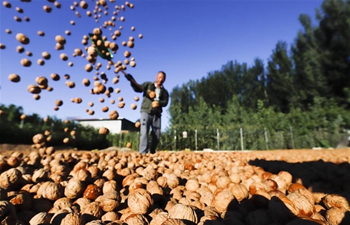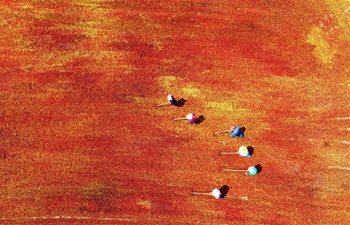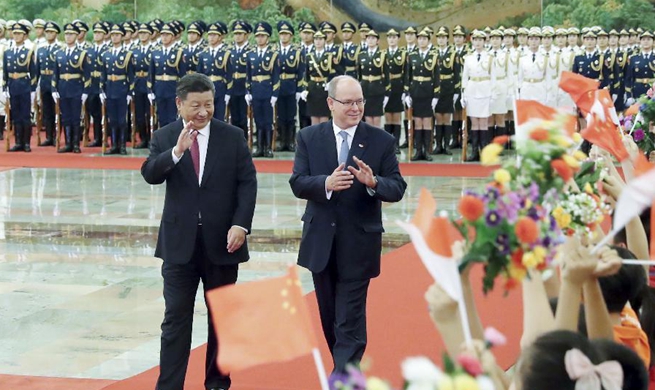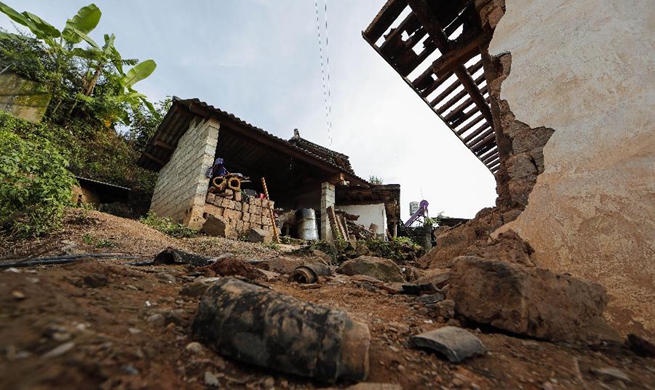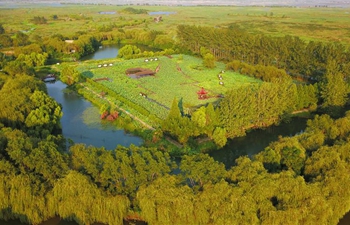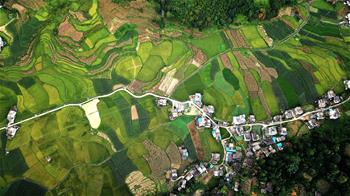by Burak Akinci
ANKARA, Sept. 8 (Xinhua) -- The tripartite summit in Tehran has offered no clear answers to the fate of the last rebel-held area of Syria's northwestern Idlib province while Turkey warned of a "bloodbath" and a new large-scale influx of refugees in case of a looming Russian-backed Syrian offensive.
Speaking at the summit on Friday with his Iranian and Russian counterparts Hassan Rouhani and Vladimir Putin -- both major allies of the Syrian government -- Turkish President Recep Tayyip Erdogan stressed that an attack on Idlib would result in a massacre and a disaster, proposing a cease-fire, fearing the destabilization of areas his country now hold in Syria.
"If we can ensure a cease-fire here, this will be one of the most important steps of the summit, it will seriously put civilians at ease," he said. "We need to find a rational solution in Idlib that will address everyone's concerns."
Idlib is designated as a de-escalation zone by Turkey, Russia and Iran, and Turkish armed forces have so far built 12 observation posts in the region as part of the Astana deal that was brokered by the three countries.
The majority of Idlib is held by former Syrian affiliates of Al-Qaida and extremists militants groups.
"A decision on Idlib will shape the region and you must appreciate our position as we begin to help our Syrian brothers," Erdogan said.
Russian President Putin, who favors a muscular approach, said that he was against a cease-fire because the Nusra Front and Islamic State (IS) fighters located there were not part of the peace talks.
Putin said the Syrian government should regain control over all of its territory.
Turkey has held some intensive diplomatic dialogue on this crucial question in recent weeks with western and regional allies and the conclusions of the Tehran summit show that these efforts have neither succeeded nor failed, said analysts.
All three participants countries to the summit are facing separately increasing U.S. pressure and sanctions, and their meeting highlighted the stark differences among them on the seven-year-old Syrian war.
"The Idlib question was doomed to explode one day or another," Togrul Ismayil, a professor in Kahramanmaras University told Xinhua.
Ismayil argued that a large-scale offensive in Idlib would be "very risky for Russia as it can alienate Turkey" and also ostracize Moscow from western power seven more, who have warned of catastrophic results of a massive offensive.
But Ismayil also underlined that some targets, considered as terrorists, will be hit eventually by the Russian-backed Syrian regime in order to show that they have the upper hand in the war.
"These three countries have never reached a strategic point of view on the Syrian war as they have contradicted opinions," said this expert underlining that each of the three nations has their own interests in the conflict.
For Oytun Orhan, a specialist on the Middle East and the Center for Middle Eastern Strategic Studies (ORSAM), the Idlib issue has put the Astana participants to the test but that Turkey's concerns have been taken into account.
"There is still uncertainty regarding Idlib but at least the trilateral Astana cooperation is alive," he said, adding that the prospect of a large-scale ground offensive in the province seems to be averted.
"Russia will want in the near term to get rid of pockets of extremists near its bases in Syria with air raids, but the path for more diplomatic dialogue is still open," said the scholar, adding that Ankara for its part will most likely insist on separation of radical groups from moderate ones in Idlib.
Fighting seems looming in Idlib, where around 3.5 million civilians are living in opposition-held territory with no clear route of escape if fighting escalates.
Regime troops shelled rebel positions on Wednesday, a day after Russian warplanes ended weeks of calm with a barrage of airstrikes.
Turkey is worried that an attack on Idlib will trigger a mass exodus of refugees fleeing towards the Turkish border. Turkey already shelters 3.5 million Syrians.
"Around 3.5 million people live there. It is again Turkey where those people will flee in case of a disaster," Erdogan told Turkish journalists before the summit.
Metin Corabatir, a local expert on refugee issues, told Xinhua that this scenario will be "a disaster" as Turkey is already saturated with its massive refugee community, the world's largest one.
Corabatir, the president of the Ankara-based Research Center on Asylum and Migration, also insisted that Ankara should continue to negotiate with its international partners over the humanitarian situation and explain them that the burden of a potential refugee influx should be shared.
Russia has so far made no commitment not to launch an all-out attack but has also pointed to the Tehran summit. Syrian regime and Russian jets have been striking Idlib but an all-out assault has not yet begun.
Conquering Idlib would be a major victory for Syrian President Bashar al-Assad on his quest to take back all of Syria's territory and crush the rebellion which broke out against him in 2011.






